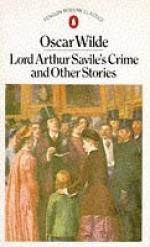|
This section contains 1,193 words (approx. 4 pages at 300 words per page) |

|
SOURCE: Guy, Josephine M. “An Allusion in Oscar Wilde's ‘The Canterville Ghost’.” Notes and Queries 243 (N.S. 45), no. 2 (June 1998): 224-26.
In the following essay, Guy investigates Wilde's allusion to the obscure late nineteenth-century materialist philosophy known as Hylo-Idealism in his story “The Canterville Ghost.”
In Notes and Queries in 1978, Philip E. Smith drew attention to an obscure late nineteenth-century materialist philosophy called Hylo-Idealism. Its main proponents were the slightly less obscure poet, Constance Naden (who coined the term), and her friend and mentor, Dr. Robert Lewins.1 In attempting to argue for the importance of Hylo-Idealism for the Victorians, Smith cited a contemporary reference to it by a much better known writer—Oscar Wilde. Thus Smith noted that ‘Oscar Wilde found the name of [the] philosophy significant enough to use in the subtitle of his often reprinted first short story, “The Canterville Ghost, A Hylo-Idealistic Romance” (1889)’. At the same...
|
This section contains 1,193 words (approx. 4 pages at 300 words per page) |

|


